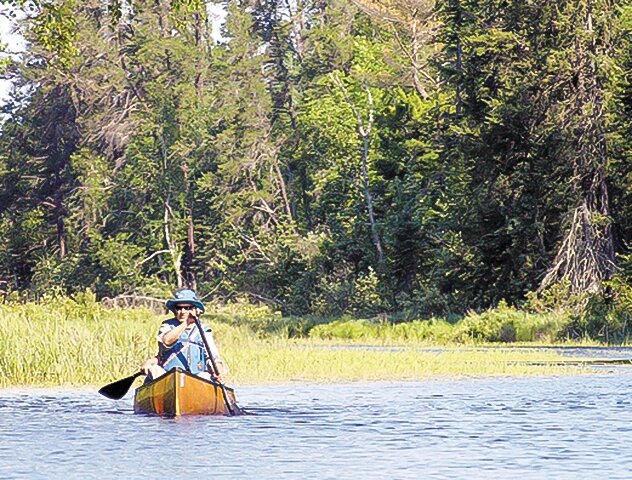Support the Timberjay by making a donation.
State to sell 80,000 acres of school trust lands
DNR and USFS cancel longstanding plan for a land exchange
REGIONAL— The U.S. Forest Service and the Minnesota Department of Natural Resources have abandoned their longstanding effort to engineer a massive land exchange for approximately 80,000 acres of state school trust property located within the Boundary Waters Canoe Area Wilderness.
Instead, the DNR is now asking the forest service to purchase the land, for an as-yet undetermined amount of money. The sale, which is expected to be completed over the next two years, would allow the state to generate revenue for the state’s school trust lands, which provide an ongoing source of funding for Minnesota schools.
“The resolution of this longstanding land management issue is a major win for Minnesota’s public-school students,” said Aaron Vande Linde, director of the state’s office of school trust lands. “The project’s culmination will result in millions of dollars deposited into the Permanent School Fund. This investment will support the state’s public education system in perpetuity, fulfilling our fiduciary duty to ensure that both current and future beneficiaries receive maximum economic returns from school trust assets.”
The designation of the Boundary Waters as a federal wilderness has, for decades, sharply limited the state’s ability to generate revenue from the trust lands located within the wilderness boundaries. Traditionally, the state has generated revenues from school trust land either through the sale of the land itself, from the sale of timber, or the leasing of mineral rights. Given that logging and mining have been prohibited in the BWCAW for decades, the sale of the land is the most straightforward means of generating income for the school trust.
But talk of a sale had regularly prompted pushback from local lawmakers, who argued that the school trust would be better served by a land exchange, through which the state would obtain federal lands outside the wilderness, where extractive activities would be encouraged. The DNR and the forest service agreed to pursue the exchange back in 2012, but the effort languished for multiple reasons, according to Vande Linde. “This was the largest land exchange project in the nation, with a lot of very intricate issues in the Boundary Waters that we had to work through,” he said.
All three parties involved in the exchange—the DNR, the forest service, and The Conservation Fund, a nationwide nonprofit, had invested considerable time in the process and commissioned several different appraisals in an effort to find an exchange of equal value but could never reach agreement on the valuations. More recently, said Vande Linde, during federal consultation with the three 1854 bands, including Fond du Lac, Bois Forte, and Grand Portage, it became clear that the exchange was not going to meet tribal goals for the affected lands. “So, we opted to go in a different direction,” Vande Linde said.
While some lawmakers had argued in the past that an exchange would ultimately yield a better return to the school trust, Vande Linde strongly disputes that suggestion. “It comes down to the time value of money,” he said. “The trust will receive cash on the barrel and be able to invest it straight-away.” According to Vande Linde, it would take many decades, likely even more than a century, to generate enough revenue through timber sales on the exchanged lands to even match the original purchase price the school trust will receive once the sale is completed. By that time, through investment, the school trust will have earned many times that amount, thereby meeting the trust’s obligation to maximize revenue generation.
“The state’s school trust lands are designated to maximize long-term economic return for the Permanent School Fund and provide a continual source of funding for every K-12 public school district in the state,” said DNR Commissioner Sarah Strommen. “This important land transaction ensures that the DNR can fulfill its fiduciary responsibility to the school trust.
The deal will also benefit the forest service, according to Tom Hall, forest supervisor on the Superior National Forest, where the trust lands are located. “The purchase of these lands will help reduce administrative issues the state and the forest service have faced for a long time,” he said.
The proposal is also backed by the 1854 bands as well as environmental groups. “This is a good day for the Boundary Waters Canoe Area Wilderness and Minnesota students,” said Ingrid Lyons, executive director of Save the Boundary Waters. “It solves a key issue that has been unresolved for thirty years.”
Third District Sen. Grant Hauschild had no immediate comment on the proposal, but said he planned to meet soon with DNR officials for a briefing on the plan.
Moving forward
Completing the sale won’t happen overnight. The state is constitutionally prohibited from selling school trust lands, except at public auction, so a massive, pre-arranged sale to the U.S. Forest Service will require a different process. According to Vande Linde, the state will need to pursue a condemnation proceeding involving the 80,000 acres of trust land in the wilderness, which will remove the trust status from the lands, making it possible to sell it to the federal government.
The condemnation proceedings will need to include a new appraisal, which will be used as a basis for a final agreement on the purchase price. The forest service is expected to tap funding from the federal Land and Water Conservation Funds to complete the acquisition.
With the cancellation of the land exchange, the forest service may end up acquiring additional lands within the boundaries of the national forest. The Conservation Fund is now proposing to sell up to 15,000 acres, located outside the BWCAW to the forest service. At the same time, the DNR is evaluating some of the nonprofit’s lands in consultation with the forest service, local counties, and 1854 bands, to identify parcels suitable for state acquisition.






